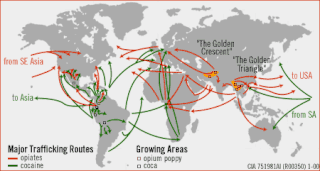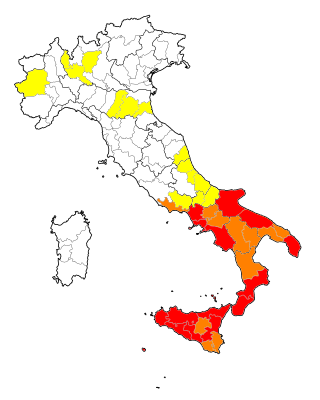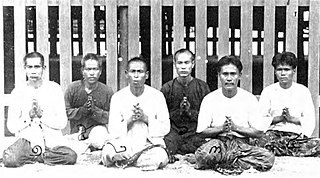Related Research Articles
The Calabrian Mafia or 'Ndrangheta is a prominent Italian Mafia-type organized crime syndicate based in the peninsular region of Calabria and dating back to the 18th century. It is considered the most powerful organized crime group in the world. Since the 1950s, following wide-scale emigration from Calabria, the organization has established itself worldwide. It is characterized by a horizontal structure made up of autonomous clans known as 'ndrine, based almost exclusively on blood ties. Its main activity is drug trafficking, on which it has a near monopoly in Europe, but it also deals with arms trafficking, money laundering, racketeering, extortion, loan sharking, and prostitution. The 'Ndrangheta enjoys a privileged relationship with the main South American cartels, which consider it their most reliable European partner.

The Royal Canadian Mounted Police, commonly known in English as the Mounties is the federal and national police service of Canada. As police services are the constitutional responsibility of provinces and territories of Canada, the RCMP's primary responsibility is the enforcement of federal criminal law, and sworn members of the RCMP have jurisdiction as a peace officer in all provinces and territories of Canada. However, the service also provides police services under contract to eight of Canada's provinces, all three of Canada's territories, more than 150 municipalities, and 600 Indigenous communities. In addition to enforcing federal legislation and delivering local police services under contract, the RCMP is responsible for border integrity; overseeing Canadian peacekeeping missions involving police; managing the Canadian Firearms Program, which licenses and registers firearms and their owners; and the Canadian Police College, which provides police training to Canadian and international police services. Despite its name, the Royal Canadian Mounted Police are no longer an actual mounted police service, and horses are only used at ceremonial events.
Life imprisonment is any sentence of imprisonment for a crime under which convicted people are to remain in prison for the rest of their natural lives or indefinitely until pardoned, paroled, or otherwise commuted to a fixed term. Crimes for which, in some countries, a person could receive this sentence include murder, torture, terrorism, child abuse resulting in death, rape, espionage, treason, drug trafficking, drug possession, human trafficking, severe fraud and financial crimes, aggravated criminal damage, arson, kidnapping, burglary, and robbery, piracy, aircraft hijacking, and genocide, crimes against humanity, war crimes, severe cases of child pornography, or any three felonies in case of three-strikes law. Life imprisonment can also be imposed, in certain countries, for traffic offences causing death. Life imprisonment is not used in all countries; Portugal was the first country to abolish life imprisonment, in 1884.

Police brutality is the excessive and unwarranted use of force by law enforcement against an individual or a group. It is an extreme form of police misconduct and is a civil rights violation. Police brutality includes, but is not limited to, asphyxiation, beatings, shootings, improper takedowns, and unwarranted use of tasers.

The illegal drug trade or drug trafficking is a global black market dedicated to the cultivation, manufacture, distribution and sale of prohibited drugs. Most jurisdictions prohibit trade, except under license, of many types of drugs through the use of drug prohibition laws. The think tank Global Financial Integrity's Transnational Crime and the Developing World report estimates the size of the global illicit drug market between US$426 and US$652 billion in 2014 alone. With a world GDP of US$78 trillion in the same year, the illegal drug trade may be estimated as nearly 1% of total global trade. Consumption of illegal drugs is widespread globally and it remains very difficult for local authorities to reduce the rates of drug consumption.

The Peel Regional Police (PRP) provide policing services for Peel Region in Ontario, Canada. It is the second largest municipal police service in Ontario after the Toronto Police Service and third largest municipal force in Canada behind those of Toronto and Montreal, with 2,200 uniformed members and close to 875 support staff.

Capital punishment in Singapore is a legal penalty. Executions in Singapore are carried out by long drop hanging, and they usually take place at dawn. Thirty-three offences—including murder, drug trafficking, terrorism, use of firearms and kidnapping—warrant the death penalty under Singapore law.

The Winnipeg Police Service is the police force of the city of Winnipeg, Manitoba, Canada.

Organized crime in Italy and its criminal organizations have been prevalent in Italy, especially Southern Italy, for centuries and have affected the social and economic life of many Italian regions since at least the 19th century.

Law enforcement in Canada is the responsibility of police services, special constabularies, and civil law enforcement agencies, which are operated by every level of government, some private and Crown corporations, and First Nations. In contrast to the United States or Mexico, and with the exception of the Unité permanente anticorruption in Quebec and the Organized Crime Agency of British Columbia, there are no organizations dedicated exclusively to the investigation of criminal activity in Canada. Criminal investigations are instead conducted by police services, which maintain specialized criminal investigation units in addition to their mandate for emergency response and general community safety.

Comando Vermelho, also known as C.V., is a Brazilian criminal organization engaged primarily in drug trafficking, arms trafficking, protection racketeering, kidnappings-for-ransom, armored truck hijackings, loansharking, irregular warfare, narco-terrorism, and turf wars against rival criminal organizations, such as Primeiro Comando da Capital and Terceiro Comando Puro. The gang formed in 1979 out of a prison alliance between common criminals and leftist guerrillas, who were imprisoned together at Cândido Mendes. The prisoners formed the alliance to protect themselves from prison violence and guard-inflicted brutality; as the group coalesced, the common criminals were infused with leftist social justice ideals by the guerrillas. In 1979, prison officials labeled the alliance “Comando Vermelho,” a name which the prisoners eventually co-opted as their own. In the 1980s, the gang expanded beyond Ilha Grande into other prisons and the favelas of Rio de Janeiro, and became involved in the rapidly growing cocaine industry. Meanwhile, Brazil’s shift towards democracy and the eventual end of the military dictatorship in 1985 allowed the leftist guerrillas to re-enter society; thus, the CV largely abandoned its left-wing ideology.
Crime has been recorded in the United States since its founding. Crime rates have varied over time, with a sharp rise after 1900 and reaching a broad bulging peak between the 1970s and early 1990s. After 1992, crime rates began to fall year by year and have since declined significantly. This trend lasted until 2015, when crime rates began to rise slightly. This reversed in 2018 and 2019, but violent crime increased significantly again in 2020. Homicide rate in the U.S. continues to be high, with four major U.S. cities ranked among the 50 cities with the highest homicide rate in the world in 2019. Despite the increase in violent crime, particularly murders, between 2020 and 2021, the quantity of overall crime is still far below the peak of crime seen in the United States during the late 1980s and early 1990s, as other crimes such as rape, property crime and robbery continued to decline. The aggregate cost of crime in the United States remains high, with an estimated value of $4.9 trillion reported in 2021. In 2022, crime began to decline again; although remains higher than pre-pandemic levels of crime and murder has begun to fall sharply over the first half of 2023.

Crime in Brazil involves an elevated incidence of violent and non-violent crimes. Brazil possesses high rates of violent crimes, such as murders and robberies. Brazil's homicide rate was 27.4 homicides per 100,000 inhabitants according to the UNODC, placing Brazil in the top 20 countries by intentional homicide rate. In international crime rankings however, Brazil is generally not considered amongst the top 20 most dangerous countries in the world but top 50 with many homicides being between gangs and not affecting the general populace and no large scale wars. Brazil is the country with the highest number of intentional homicides in the world, with 57,358 in 2018, or possibly second to Nigeria which lacks accurate data but was estimated at 64,201 in 2016. In recent years, the homicide rate in Brazil has begun to decline. The homicide rate was 20.64 per 100,000 in 2020 with 43,879 killings, similar to 2019, but down from 30.67 per 100,000 in 2017.
Human trafficking in Canada is prohibited by law, and is considered a criminal offence whether it occurs entirely within Canada or involves the "transporting of persons across Canadian borders. Public Safety Canada (PSC) defines human trafficking as "the recruitment, transportation, harbouring and/or exercising control, direction or influence over the movements of a person in order to exploit that person, typically through sexual exploitation or forced labour. It is often described as a modern form of slavery."

Though the Cuban government does not release official crime statistics, Cuba is considered one of the safer countries in Latin America. Gun crime is virtually nonexistent, drug trafficking has been largely curtailed, and there is below-average crisis intervention from police. Murder rates are also below those of most Latin American countries, with an intentional homicide rate of 5.00/100,000 inhabitants in 2016, lower than any other country in the region.

A triad is a Chinese transnational organized crime syndicate based in Greater China with outposts in various countries having significant overseas Chinese diaspora populations.
Indo-Canadian organized crime or Punjabi-Canadian organized crime is made up predominantly of young adults and teenagers of Indian Punjabi ethnic, cultural and linguistic background, typically ethnic Jatt Sikhs. Collectively, these groups are among the top 5 major homegrown organized crime hierarchy across the nation in Canada coming in 3rd place, after the Asian Triads and White biker gangs. The 2004 RCMP British Columbia Annual Police Report ranked them third in terms of organization and sophistication in British Columbia, ranked behind outlaw motorcycle clubs and aforementioned Chinese criminal organizations such as the Triads drug clans.

The Bacchus Motorcycle Club (BMC) is an Outlaw motorcycle club in Canada. Founded during 1972 in Albert County, New Brunswick. Bacchus MC has since increased its influence, opening fifteen chapters in five Canadian provinces. It is currently the third largest Canadian established 1% motorcycle club.

The armed conflict for control of the favelas in Greater Rio de Janeiro is an ongoing continuous, since 2006, armed conflict between Brazilian militias and subgroups, Primeiro Comando da Capital, Comando Vermelho, Amigos dos Amigos, Terceiro Comando Puro and the government.
The Hells Angels Motorcycle Club, an international outlaw biker gang, has been involved in multiple crimes, alleged crimes, and violent incidents in Canada. The Criminal Intelligence Service Canada (CISC) has designated the Hells Angels an outlaw motorcycle gang. Hells Angels MC have been linked with drug trafficking and production, as well as many violent crimes including murder, in Canada.
References
- 1 2 "Clermont". Geographical Names Data Base . Natural Resources Canada.
- ↑ "PlaceFinder". www.gov.pe.ca. Retrieved June 13, 2023.
- ↑ MacPhee, Nancy (March 11, 2013). "Cocaine seized in Prince County | SaltWire". www.saltwire.com. Retrieved June 13, 2023.
- ↑ "Clermont". PEI Community Navigators. Retrieved 2023-06-13.
- ↑ Government of Canada, Royal Canadian Mounted Police (2022-10-21). "Clermont man charged with criminal negligence causing death, drug trafficking | Royal Canadian Mounted Police". Royal Canadian Mounted Police (Press release). Retrieved 2023-06-13.
- ↑ "Man from Clermont, P.E.I., facing charges of criminal negligence causing death, drug trafficking". CBC News. October 21, 2022. Retrieved 2023-06-12.